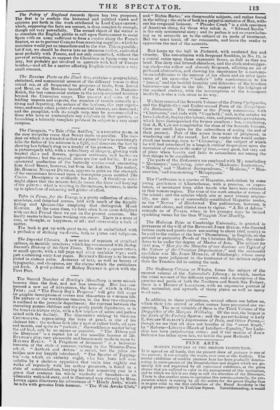The Second Number of Bentley's Miscellany is more mi , cel- laneous
than the first, and not less amusing. Boz has com- menced a new set of adventures, the hero of which is Oliver Twist ; and " The Parish Boy's Progress" will give full scope for graphic descriptions of scenes and characters in common life. The picture of the workhouse inmates, in the first two chapters, is confined to the juvenile department: the contrast between the starveling pauper children and the portly parish dignitaries, is in the broad caricature style, with a few touches of satire and pathos mixed with the drollery. The illustrative etching by GEMIGE CRUIKSHANB, representing the boys at gruel, is one el his choicest bits : the urchins luck like a nest of callow birds, all eyes and mouth, and quite as " peckish ;" the workhouse master'befng the old bird, only by no means so parental. " The Abbess and the Dutchess " is a capital hit at the maudlin heroine of Mr. BULWER'S play, very pleasantly and humorously made in verse by HAYNES BAYLY. " A Fragment of Romance" is a ludicrous travestie of the stile of romsncevwritiog in the Minerva-Press " Authors and Actors " is smart, but the jokes are neither new nor happily introduced. " The Spectre of Tapping- Ion "—in which an unlucky Wight, w ho has been left sans culottes by a skeleton apparition that visits him nightly and walks off regularly with his nether garments, is found in a
state of somnambulism, burying his last remaining pair in a grave that contains his whole wardrobe of breeches—is an admirably well-tuld story, and is illustrated very cleverly by Buss. Lovett again illustrates his adventures of " Handy Andy," which he tells with genuine Irish humour. " The Wide Awake Club," and " Richie Barter," are disagreeable subjects, and rather forced in the telling : the style of both is a palpable imitation of Boz, with- out his congenial humour. " Plunder Creek" is a rich specimen of American slang, for those who relish it. " Edward Saville" is the only sentimental story ; and its pathos is not so overwhelm- ing as to reconcile us to the subject or its mode of treatment. But we must break off our comments, and leave the reader to appreciate the rest of the contents.


























 Previous page
Previous page